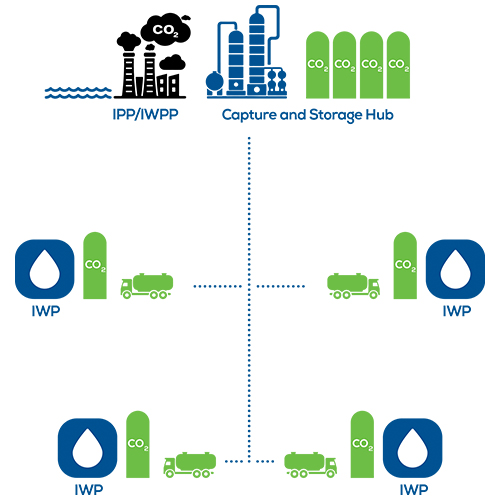 Carbon Capture & Utilization
Carbon Capture & Utilization
-
In our latest quest for contributing towards NET-ZERO emissions along with making desalination plants self-sustainable, we help integrated water and power plants reduce their overall emissions through Flue Gases by retrofitting existing systems with our Flue Gas based Carbon Capture plants.
- Reduce per m3 desalinated water cost
- Combat volatile availability and prices
- Carbon capture can also play a role in addressing water scarcity and improving water quality by reducing the impact of power generation on water resources.
- Guaranteed food-grade liquid CO2
- Secure your upstream supply chain
- Flexible turn down capacities
- Reduced carbon emission and support your NET-ZERO goals
- Eliminate purchasing CO2 for mineralisation, thereby reducing the overall cost of operation.

THE ADVANTAGES OF ON-SITE CO2 CAPTURE FOR DESALINATION PLANTS
A steady, cost-efficient CO2 supply is increasingly vital for desalination plants. A pioneering solution lies in leveraging Independent Water and Power Producers (IWPPs) for on-site CO2 capture. This strategy cuts costs, boosts efficiency, shrinks carbon footprint, and ensures greater control over the CO2 supply chain. In this setup, IWPPs function as core CO2 capturers, providing essential CO2 to Independent Water Producers (IWPs). This interconnected framework mitigates CO2 shortages, fostering sustainable and economically feasible operations. It presents a forward-looking solution to the CO2 supply challenge in the desalination sector.
Carbon Capture and The Future of Power and Water
- Carbon capture is seen as a key tool in the transition to a low-carbon energy system.
- It can help decarbonize industries and sectors that are difficult to electrify, such as heavy industry and aviation, which are major sources of greenhouse gas emissions.
- Carbon capture can also play a role in addressing water scarcity and improving water quality by reducing the impact of power generation on water resources.
- Carbon capture and storage can help to ensure a reliable and stable electricity supply by enabling the use of fossil fuels while reducing their environmental impact.
- Carbon capture can help to reduce water use and improve water quality by reducing the amount of water needed for cooling at power plants and reducing the release of pollutants into waterways.
- Carbon capture technology can help to reduce the cost and environmental impact of desalination by using captured CO2 to improve the efficiency of the process.
- Carbon capture can help to reduce the impact of power generation on land use by enabling the use of smaller, more flexible power plants that are easier to site and build.
- Carbon capture and storage can help to reduce the impact of power generation on biodiversity by enabling the use of lower-emitting fuels and reducing the need for large-scale infrastructure projects.
- Our Carbon Capture plants are fully customised and designed according to the Flue Gas analysis of the plant to eliminate/pacify harmful components and recover food-grade liquid CO2. Depending upon the requirement, plants can be designed for the required capacity and further lines can be added as well to recover more in the future if required. This innovative method enables you to use waste CO2 for remineralisation, offering the following advantages